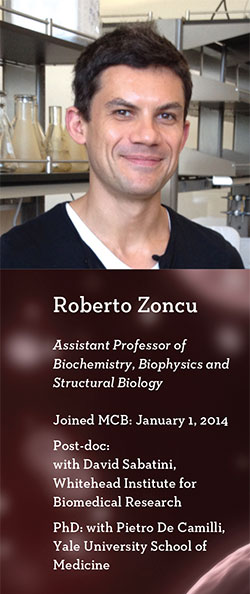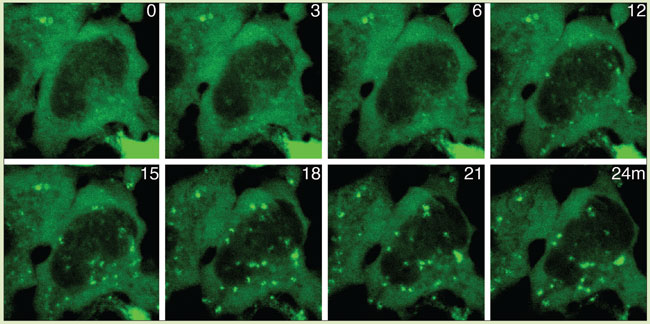MCB TRANSCRIPT

Rethinking Lysosomes: These Cleanup Crews Also Regulate Growth
Long viewed as the cell’s trash cans, lysosomes are best known for breaking down biomolecules. But it’s time for a fresh look at these organelles. Lysosomes are closer to pantries that — depending on how well they’re stocked — tell cells when and how much to grow, says MCB Assistant Professor Roberto Zoncu.

He discovered there was more to lysosomes as a post-doc, while working on a protein kinase called mechanistic target of rapamycin (mTOR). Found in bacteria, rapamycin is a drug that blocks mTOR and so extends life in mice and other organisms. “mTOR is a master metabolic regulator that makes you grow and age,” Zoncu says, adding that mTOR dysfunction is also implicated in diseases such as diabetes and cancer. “But nobody knew how it controlled these processes.”
So he decided to see where mTOR was in the cell. When Zoncu compared human cells before and after giving them amino acids, he found that mTOR went from being spread out to being concentrated on the surface of lysosomes. “The location was 100% precise,” he says. “It was one of those wow moments.”
In smaller organisms such as yeast, lysosomes store nutrients as a backup for hard times. This made Zoncu wonder if mTOR regulates growth based on how much food is stored in lysosomes. “Their contents reflect the nutritional state of the cell,” he says. “We think there has to be food in lysosomes for mTOR to bind.”
Indeed, he found that when the lysosome “pantry” is well-stocked, amino acids on the inside activate proteins (GTPases) on the outside, which in turn specifically bind mTOR. Next the lysosomes empty out, releasing nutrients that cells can use to grow. “It’s yin-yang,” Zoncu says. “The lysosome is the recycle bin where things that are damaged or not needed get broken down, and mTOR makes cells grow.”
Zoncu also found that lysosomes regulate themselves. Lysosome formation is controlled by a protein called Transcription Factor EB (TFEB), and he found that mTOR binds this transcription factor in the cytoplasm. This deactivates TFEB, keeping it out of the nucleus and so limiting the formation of new lysosomes.
Today, Zoncu studies how lysosomes and mTOR regulate metabolism and growth in mammalian cells. Ultimately, he wants to know how the nutrients we eat regulate the ability of the body to grow and repair itself, and he already knows lysosomes play a big part.
“My goal is to get everyone excited about them,” he says. “We are discovering wonderful new properties of this organelle.”
Zoncu recently had the honor of being
chosen as one of five first-ever Pew-Stewart
Scholars for Cancer Research, which supports
promising early career scientists whose
research may accelerate discovery and advance
progress towards a cure for cancer. Zoncu also recently received an NIH New Innovator Award.

on lysosomes within minutes of adding amino acids to cells.




